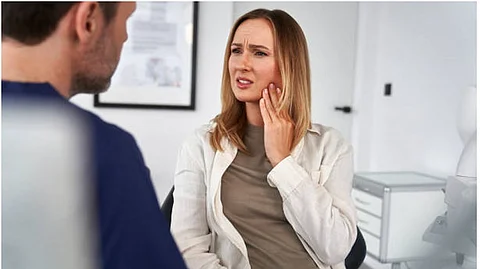Immediate Home Remedies for Dental Pain
When you're facing dental pain, several at-home remedies can help alleviate discomfort. Always remember that these remedies are not substitutes for professional care but can provide temporary relief until you can see your dentist.
Cold Compress
Using a cold compress on the outside of your face can help ease dental pain. The cold helps reduce swelling and numbs the area, making it feel less painful.Wrap some ice or a cold pack in a clean cloth before placing it on your cheek. Keep it there for 15 to 20 minutes, then wait at least 20 minutes before using it again.
Over-the-Counter Pain Relievers
Medicines like ibuprofen or acetaminophen can help reduce pain and swelling. Always follow the instructions on the label to make sure you're taking the right amount.
If you are uncertain or are taking other medications, it is best to ask your doctor or pharmacist first. These pain relievers are often a good short-term solution until you can see a dentist.
Salt Water Rinse
Rinsing your mouth with warm salt water is a simple and helpful home remedy. It can clean the area and lower inflammation, which may reduce pain.
Mix about half a teaspoon of salt into a glass of warm water and gently swish it around your mouth. Spit it out after 30 seconds and repeat a few times a day if needed.
Clove Oil
Clove oil is a natural remedy that can numb tooth pain for a short time. It has a substance called eugenol, which acts like a mild painkiller. Gently dip a cotton ball in clove oil and press it against the sore spot in your mouth. Don't swallow the oil, and only use a small amount to avoid irritation.
Things to Avoid
While managing dental pain at home, it is essential to steer clear of certain practices that may worsen the situation. Here are some crucial actions to avoid:
Ignoring the Pain
It may be tempting to ignore tooth pain, especially if it is intermittent. But ongoing pain is often a sign that something more serious is going on, like an infection or decay. While home remedies can help for a short time, they don't fix the root problem. It's important to see a dentist to find out what's really causing the pain.
Using Hot Compresses
Applying heat to the outside of your face might seem comforting, but it can actually make things worse. Heat can increase blood flow to the area, which may lead to more swelling and pain. Cold compresses are typically a better choice for dental issues. They help reduce swelling and numb the pain without causing irritation.
Rubbing Alcohol
Some people suggest using rubbing alcohol to kill germs in the mouth, but this is not safe. Rubbing alcohol can irritate the sensitive tissues inside your mouth, potentially worsening the pain. It's better to stick with gentle, proven remedies like salt water rinses or clove oil. If the pain doesn't go away, make an appointment with your dentist.
Long-Term Strategies to Prevent Dental Pain
While immediate relief is important, focusing on long-term strategies can help prevent future dental pain. Good oral hygiene practices, regular check-ups, and a healthy diet will reduce your risk of developing dental issues.
Maintain a Rigorous Oral Hygiene Routine
Taking care of your teeth daily helps to prevent cavities, gum disease, and bad breath. Brush your teeth twice a day using fluoride toothpaste to keep your enamel strong.
Don't forget to floss daily to clean between your teeth where your brush can't reach. Also, remember to replace your toothbrush every three to four months or sooner if the bristles look worn.
Regular Dental Check-ups
Even if your teeth feel fine, you should still visit a dentist regularly. Dentists can spot problems early, before they become painful or harder to treat.
These visits frequently include cleanings and X-rays to check for concealed issues. It is important to visit the dentist at least once a year, though some people may need more frequent visits.
Healthy Diet
What you eat plays a big role in keeping your teeth and gums healthy. A diet low in sugar helps prevent tooth decay, while foods rich in vitamins and minerals support strong teeth.
Calcium and vitamin D are especially important for building and maintaining tooth strength. Phosphorus also helps rebuild enamel that may have been weakened by acids or bacteria.


